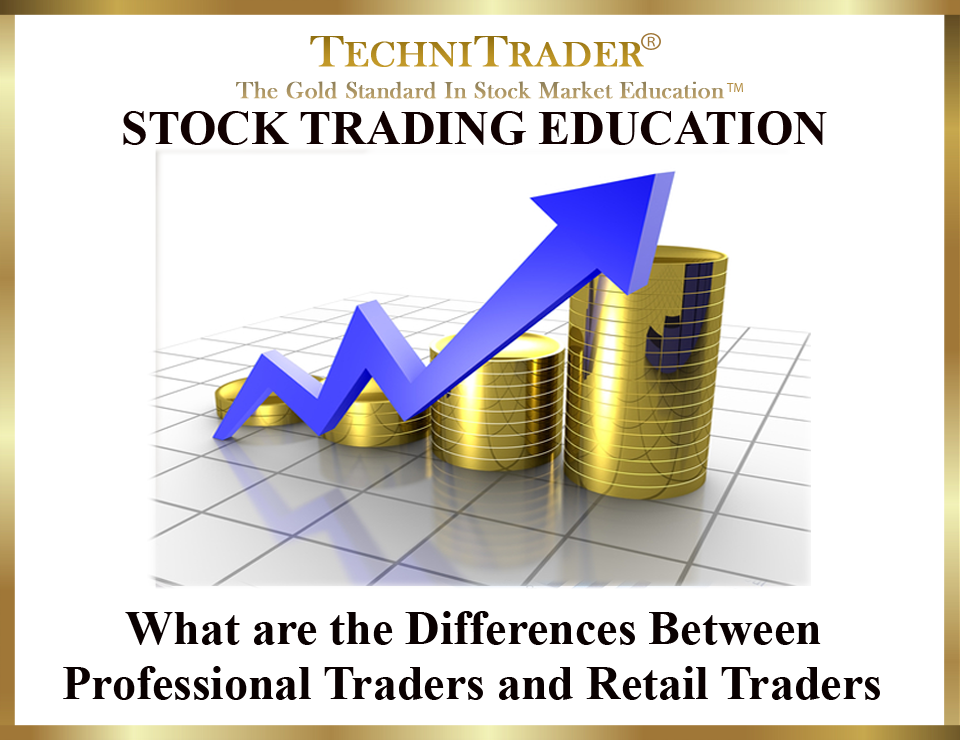What Are the Differences Between Professional Traders & Retail Traders?
Lists of Differences and Viewpoints
Many Retail Traders assume that they are learning how to trade from a Professional Trader and that they are trading like a Professional Trader. This can pose inherent problems for the Retail Trader who is actually simply mimicking another Retail Trader. The Securities and Exchange Commission (SEC) recently fined companies whose representatives claimed they were “Professional Traders” when they were not; to find out more about this, go to their website.

Here are some of the differences between Professional Traders and Retail Traders in the Stock Market:
1. Income and Profits
Professional Traders earn 6–7-digit figure incomes.
Most Retail Traders lose money year over year. A few make minimal net profits, but they do not pay themselves a wage for doing so.
2. Stock Analysis
Professional Traders who are Proprietary Desk Traders or Buy Side Institution Floor Traders do not select stocks to trade. They are given a list of stocks to buy, sell, or sell short. This list is developed starting with Fundamental and Quantitative Analysis, followed by a screening of Risk Assessment and Risk Analysis.
The Portfolio Manager makes the final decisions before the list is handed over to a Professional Trader based on their expertise in specific trading instruments and stocks, as well as their talent for executing these trades to the benefit of the institution’s goals.
Retail Traders must do all 3 analyses for themselves. First, they must be able to quickly find stocks to trade using Technical Analysis that fits their Personal Trading Parameters, Risk Tolerance, Stock Trading Style, and Personal Goals. Then, the Retail Trader must determine risk factors based on the requirements and parameters to screen down to a few stocks. Finally, the Retail Trader trades the stock using a complete Trading Process.
Unfortunately, most Retail Traders skip performing these analyses and just use recommended stocks, stocks in the news or chat rooms, or StockTwits, setting themselves up for predatory trading systems to take advantage of their lack of skill. Risk Analysis is rarely done by the Retail Trader, who often chooses the highest-risk stock to trade ending with a huge loss.
3. Stock Trading Styles
Professional Traders have learned more than one Trading Style and have set up technical systems, which are a group of Indicators, Chart Layouts, and Parameters for each Trading Style. This makes it easy and fast for the Professional to switch Styles or Technical Indicators to fit the current Market Condition. Professionals often develop their own Proprietary Indicators and Period Settings that they do not share with anyone else. Unfortunately, most Retail Traders use only a couple of Public Domain Indicators that millions of traders use, setting themselves up for predatory systems used by High Frequency Traders (HFTs) to find Cluster Orders and Retail Trading Systems’ Orders to move price ahead of Retail Small-Lot Orders. Unlike Professional Traders, Retail Traders do not like Proprietary Indicators. Professionals know that having for example Proprietary Indicators and Trading Styles ensures that no predatory trading system can track their activity. They are stock trading in a manner that best suits their style and goals instead of following the crowd mentality.
4. Stock Market Data
Professional Traders spend anywhere from $5,000–$50,000 a month on information, data feeds, analytics, etc. Even the Independent Professional Traders trading alone for themselves spend enormous amounts of money to receive accurate and reliable data, news ahead of every retail news feed, and background information that help them make better trading decisions.
Retail Traders grumble about spending $100 a month or $30 a month for quality charts when the Professionals are spending $5,000–$10,000 or more a month for technical tools.
Unfortunately, Retail Traders, especially Hobby Traders, want everything to be free. This means that Retail Traders and Hobby Traders are getting out-of-date information, unreliable data, misrepresented information, gossip, chatter, and far less reliable news than the Professionals.
LEARN MORE at TechniTrader.Courses
Trade Wisely,
Martha Stokes CMT
Chartered Market Technician
Instructor & Developer of TechniTrader Stock & Option Courses
Copyright ©2017–2025 Decisions Unlimited, Inc. dba TechniTrader. All rights reserved.
TechniTrader is also a registered trademark of Decisions Unlimited, Inc.
